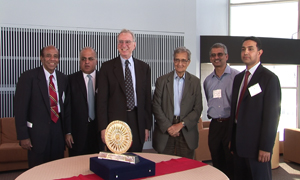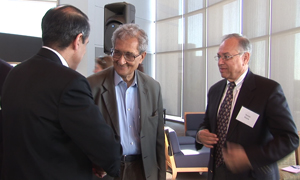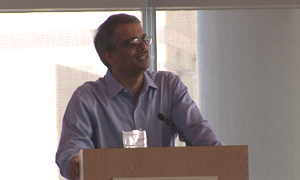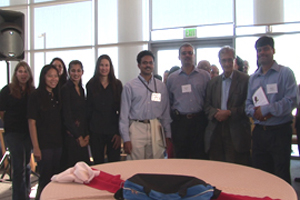Nobel Prize-Winning Economist Receives Chakra Award at Calit2 Luncheon
By Doug Ramsey, 858-822-5825, dramsey@ucsd.edu
San Diego, CA, October 8, 2006 -- At a luncheon organized by the UCSD Division of Calit2 and the San Diego Indian American Society (SDIAS), Nobel Laureate Amartya Sen accepted an award from an influential group of San Diegans involved with India.
|
Sen, a Harvard economist who received the Nobel Memorial Prize in Economics in 1998 for his groundbreaking work on social choice theory and welfare economics, was presented with the Chakra Award by QUALCOMM founder Irwin Jacobs on behalf of SDIAS.
After noting that Sen and he were both born in 1933, Jacobs put his own company's work in the framework of Sen's writings. "One of his books, Poverty and Famine, maintains that the root cause of famine is not a lack of food production but rather a lack of distribution," noted Jacobs. "At QUALCOMM we keep pressing on not just providing voice communication but data communications as well, so they can get the information to improve distribution systems and the sources of food."
"I will say I frankly think I don't deserve the award," said Sen modestly in accepting the silver-and-gold statuette in the shape of a Konark wheel. The honor has previously gone to dignitaries including Bose Corporation founder Amar Bose, conductor Zubin Mehta and music legend Ravi Shankar.
"In many ways this part of California has things the other parts do not have," Sen told the audience, more than half of whom were of Indian extraction. "It's not just the climate, but also that it owes so much to the diversity from immigration."
|
Issues of identity and diversity are explored in Sen's 2006 book, Identity and Violence: The Illusion of Destiny , on which he based his public lecture, "The Illusion of Identity," later in the day to an overflow audience at the Institute of the Americas. But he gave his luncheon audience a glimpse of the topic, pointing out that India was a mixture of ethnicity and religions "right from the beginning."
"That's why so many of us are so upset with India today being portrayed as monochromatic," he said. "Yet our President is Moslem, our Prime Minister is a Sikh, the leader of our largest political party is Christian. I think there is something to be proud of there, that race and religion are not seen as an issue. President Abdul Kalam is seen as a scientist and as an economist, as a remarkably good political leader, not as a Moslem political leader."
|
Sen's visit to UC San Diego was organized by the university's Center for the Humanities and the Dean of Arts & Humanities, Michael Berstein. Calit2 was invited to host the luncheon because of its ongoing engagement with Indian research and government institutions, since hosting the U.S.-India Education, Research & Technology Summit in late May. "There has been tremendous interest in Professor Sen's visit, in part because his ground-breaking work on everything from development economics to the economics of war and peace, which resonate with a wide audience," said Ramesh Rao in his remarks opening the luncheon in Sen's honor. Rao also noted that "San Diego is not a city known in India as widely as it perhaps should be, but there clearly have been a handful of very remarkable men from India who have made San Diego their home, including Ravi Shankar today."
San Diego City Council president Scott Peters presented Sen with a commendation from the City Council. "Dr. Sen has been recognized time and time again for his altruistic efforts as one of our world's finest masters of modern economics," said Peters. "Today we get an opportunity to recognize his unique perspective and to thank him for continuing to lead an intellectual life of esteemed service."
|
After Sen accepted his award, M.C. Madhavan -- who founded the San Diego Indian American Society in 1984 -- provided the luncheon's final remarks. "Dr. Sen is a person who belongs to a handful of people in India, in the sense that he is one of the few to have received the highest honor in the country, the Bharat Ratna," said Madhavan, a former professor at San Diego State University. "It is my personal privilege to honor a very precious jewel of India."
|
Related Links
San Diego Indian American Society
Amartya Sen Website






